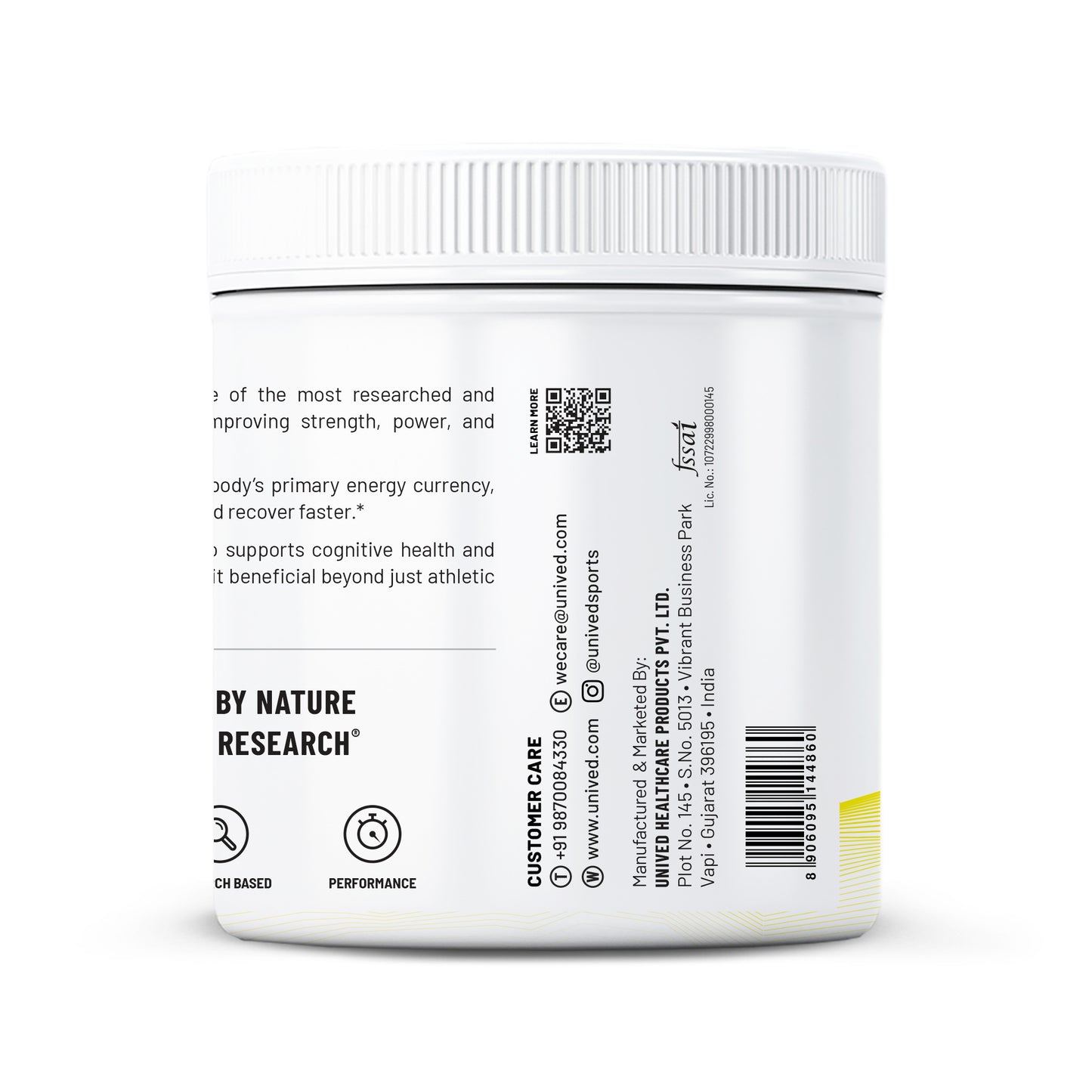









- Learn More
- Ingredients
- FAQ
What is the suggested use of Unived Creatine Monohydrate?
Adults take 1 scoop (3g) daily with 200ml of water or a non-acidic beverage of your choice. It is recommended that athletes take creatine with a high carbohydrate drink (e.g. juice or concentrated carbohydrate solution) or with a carbohydrate/protein supplement in order to increase creatine uptake. Drink at least 8 glasses of water a day while consuming creatine. Not to exceed the stated recommended daily usage.
Are other forms of creatine similar or superior to creatine monohydrate?
Creatine monohydrate is the recommended form. It's backed by the strongest research, with studies demonstrating its effectiveness at increasing the body's creatine stores and improving exercise performance.
Does creatine lead to water retention?
Creatine is an osmotically active substance which means it draws water when its concentration increases. Creatine is taken up into muscle from circulation by a sodium-dependent creatine transporter. Since the transport involves sodium, water will also be taken up into muscle to help maintain intracellular osmolality. It’s important to note that intracellular water is a crucial cellular signal for protein synthesis and thus drives an increase in muscle mass over time and thus there are no adverse effects because of intracellular water retention.
Is creatine an anabolic steroid?
Anabolic steroids are a synthetic version of testosterone. While the physiological and performance outcomes of anabolic steroids and creatine can be similar, their mechanisms of action and legal categorization are not. Anabolic steroids are drugs, with a different chemical structure than creatine, because creatine has a completely different chemical structure, it is not an anabolic steroid.
Does creatine cause kidney damage/renal dysfunction?
Experimental and controlled research indicates that creatine supplementation, when ingested at recommended dosages, does not result in kidney damage and/or renal dysfunction in healthy individuals.
Does creatine lead to dehydration and muscle cramping?
Creatine alters the body's stored water content by driving additional water into your muscle cells because of its osmolyte action. This fact may be behind the myth that creatine causes dehydration. However, this shift in cellular water content is minor, and no research supports the claims about dehydration. Studies indicate Creatine supplementation reduced the frequency of symptomatic muscle cramping by 60% [10]. Experimental and clinical research does not validate the notion that creatine supplementation causes dehydration and muscle cramping.
Does creatine increase fat mass?
No. Creatine increases lean body mass (meaning, fat-free mass of the body) and muscle mass. Creatine supplementation does not increase fat mass.
Is a creatine ‘loading phase’ required?
You do not have to ‘load’ creatine unless you want to saturate muscles with creatine stores quickly in a short period. For instance, if an athlete is hoping to maximize the ergogenic potential of creatine supplementation in a very short period of time ( 30 days), or if avoiding potential weight gain which can sometimes occur during creatine ‘loading’, the creatine ‘maintenance’ strategy would be a viable option. Lower daily dosages of creatine supplementation (i.e. 3-5 g/day) are effective for increasing intramuscular creatine stores, muscle accretion, and muscle performance/recovery.
Is creatine beneficial for older adults?
Creatine supplementation can increase functionality (e.g., strength, activities of daily living, delay fatigue) and muscle mass in older adults. There is a growing body of evidence showing that creatine supplementation, particularly when combined with exercise, provides musculoskeletal and performance benefits in older adults.
Is creatine only effective for males?
Creatine kinetics may vary between healthy males and females. As a result of hormone-driven changes throughout various stages of female reproduction, endogenous creatine synthesis, creatine transport, creatine kinase kinetics, and creatine bioavailability are altered over time, highlighting the potential positive implications for dietary creatine supplementation for females. Accumulating research over the past decade in postmenopausal females demonstrates that creatine supplementation during a resistance training program can improve muscle mass, upper- and lower-body strength, and tasks of functionality. Creatine supplementation appears to be a viable option for post-menopausal females to improve muscle quality and performance. There is accumulating evidence that creatine supplementation has the potential to be a multifactorial therapeutic intervention across the lifespan in females, with little to no side effects.









